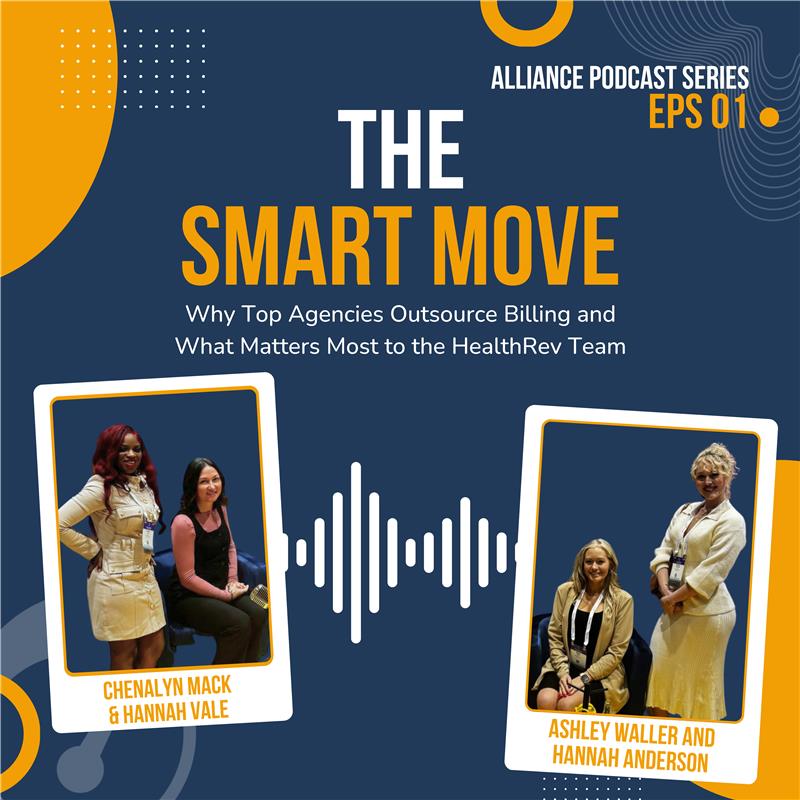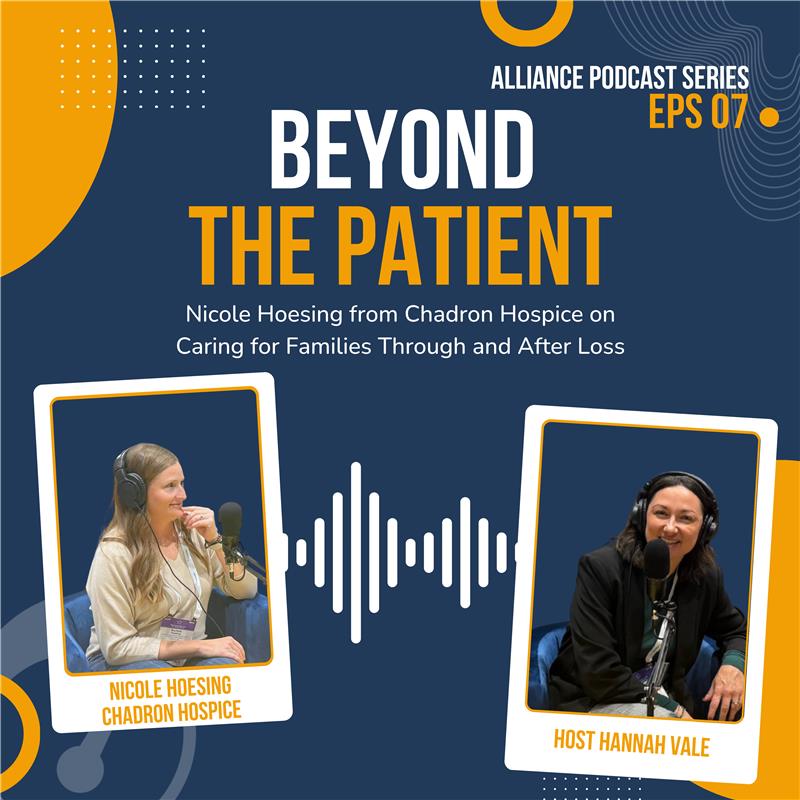Episode Transcript
[00:00:02] Speaker A: Welcome to Home Health Revealed, where we share real stories from industry leaders about home health, palliative and hospice care. Brought to you by Velocity. Velocity's easy to read coding and revenue cycle dashboards let you grab your cup of coffee and quickly see the health of your organization.
And we are back still in Chicago at the Alliance Financial Management Conference. And Sarah Nigro from Better Rx and I, Hannah Vail from Health Rev Partners, are sitting down with Mel and I'm going to let her introduce herself. But my gosh, it has been so great to get to talk to people today and just sit down and hear from industry experts, industry leaders, people who are in the field, boots on the ground, making it happen day after day. So I won't keep talking, but Melissa, would you please introduce yourself and tell us about your agency? Sure.
[00:00:50] Speaker B: Thanks for having me on, Hannah. I really enjoyed it. Yeah. So I'm Melissa Battistella and I am with Cadre Hospice. We are based out of Nashville, Tennessee and I've been there for probably about a year now and previously is with a Medicis Home Health working in their revenue cycle team there. So I come with a lot of Medicare background, Medicare Advantage background, and all things revenue cycle that comes along with all of that. So, yeah, it's been fun and interesting for sure.
[00:01:23] Speaker A: Okay, so what did you, what all did you do with the Rev cycle? Can you.
[00:01:27] Speaker B: Yeah, so I started back when, you know, like a Medicis had 32 companies. But so I've been in all aspects of anything from mergers and acquisitions and closing down and sunsetting those EMR systems and merging them into ours, just working with training, development, anything and everything you want to. You can think about payer projects, a lot of that, working through different issues with the Medicare Advantage plans and really just overcoming a lot of those challenges and then breaking down the silos, helping break down those silos within the company between, you know, your admissions department and your branches and also your managed care department.
So just really kind of closing the gap and meeting on a regular basis with those teams to really see how can we really streamline these processes.
[00:02:25] Speaker A: Wow. You've done a lot with people, process and technology, which those really are kind of the three.
[00:02:30] Speaker C: She's a terrible threat.
[00:02:32] Speaker A: Yes, she is. And that's managing a lot of change.
[00:02:36] Speaker B: Yes.
[00:02:36] Speaker A: I mean, this industry is a little bit more resilient to change, I would say, than a lot of others. I would say a lot more actually, because it's constant. But when you're the person having the conversations and kind of leading that, it becomes challenging in a different way.
[00:02:51] Speaker B: It does. And you know, one of the things that I found successful in my career and with the teams is things continue to get more complex. And so it's really. I like that you use the word boots on the ground. I use that a lot because, you know, we have a lot of sophisticated AI data and it's only getting, you know, more sophisticated. But at the same time, you have to think about your human capital. You still have your human capital that is touching these claims and really trying to figure out what is this AI data telling me. And you still have to resolve the issues and send them back over to those, those Medicare Advantage plans.
And so I've had a lot of success in teaching the teams how to really collect Medicare, Medicare, Understanding Medicare. And then they can move over to a Medicare Advantage plan and then kind of peel back the layers of the onion to say, okay, this is, they're not paying this right or they're not paying this right or you know, they want two authorizations on a PDGM claim, which you can't have, right? And you can only have one. So then you have this, you know, ton of denials due to that. So it's teaching them how to learn Medicare. And then also documentation is so key because you don't realize it when it's happening, that this one denial has now unraveled and you have, you know, 500 denials for the same reason. So it's, it's really documenting very clearly at that time. So then you can hopefully bundle them up into payer projects, which you hope you don't get to that point, but it's really documenting and going through that, that reauthorization process or that reconsideration process, going through that process and getting these, these claims paid. And when you bundle them up, then you can allow your other staff members to go through their normal course of business and tackle these other low level, you know, things that are just kind of one offs and take those to a leadership perspective.
[00:05:05] Speaker A: It's amazing how quickly something can snowball.
[00:05:08] Speaker B: Yes.
[00:05:08] Speaker A: For that reason, you know, we have an RCM team. That's what Health Rev does. And so we tell the team, if it happens twice, consider it a trend. Because the minute you start letting that go for another day, two days, if you let something go for a day, it's going to take two days to catch back up. In rcm you have to stay on top of those things. But doing those root cause analysis, bundling those payer projects, it takes time. It takes investigative work and so, you know, we always talk about how simple billing is, but it's simply complex because the more you start unraveling. And I always joke that when agencies come to us, they don't come to us because they have it all together. They come to us with a tangled ball of yarn that they want to hand me, and they want a sweater back in 30 days. And the minute you start, like, pulling that ball of yarn apart and saying, okay, well, what does your payer setup look like? Have you read your contract? What's your appeal process?
Are, you know, are you even billing out on the correct form? Right. Are you. You just start getting into all this detail. Hats off to you. Yeah, I know.
[00:06:08] Speaker C: Well, and. And you're such a wealth of knowledge. You know, even just hearing you speak, like, you've definitely seen it at all. Facets of how this business. How. How to run a successful home health or hospice. And so I'm curious, you know, because we're here at the financial managers conference, what would you say is, like, your key to success? Like, the one thing that you know that you need to ensure the success of your agency.
[00:06:30] Speaker B: So one thing that I know that I need is, you know, really investing in your people.
Sometimes I feel like that can get overlooked and they get really overwhelmed. We all do. Right.
[00:06:43] Speaker A: With.
[00:06:43] Speaker B: We get overwhelmed when things start snowballing really fast.
So I think that it's time to.
I've taken our team back a step to say, okay, let's train, let's learn. Don't worry about productivity right now.
Let's just learn. Ask questions. Let's see what you know. Where do we need to go? Where do we need to fill in the gaps and take six months to do that? Six months sounds like a long time, but it's really not, because then after that, you can keep up with the snowballs. Yeah.
[00:07:15] Speaker C: You've paved the way. You have the process now, and you've had the opportunity to poke the holes and fail ultimately, like, you want to fail in a safe kind of test environment instead of failing when it's necessarily like a patient life or a huge financial issue that you necessarily can't come back from. So I think it's really smart. You're almost playing in a sandbox for six months with your team and getting everybody really comfortable being uncomfortable.
[00:07:36] Speaker B: That's right.
[00:07:37] Speaker C: And then launching into kind of the next phase and evolution of your growth.
[00:07:40] Speaker B: Yeah. Yeah. And that's right. And the other thing that I found has been successful, and it's something that's really simple, but it's been really effective is that, you know, we have these, you know, we talk about these buckets of claims and it's. For me, you can call it a status code or whatever it is, but it's, it's something that's tailored for that, that payer, for that payer source. And it's all of these claims go into these, these system issues and then that way you can really see, okay, here's the steps to how to resolve it and everything kind of gets put in this bucket and you can really watch it grow. From a reporting standpoint, you can see how it's growing if the payer is truly resolving something because it could have initially denied for, say an authorization and now it's taken so long. Now it's denying for timely filing. So now you've lost the authorization, which is the root cause of this denial. And it's. Now it's a timely filing.
So it's really keeping these things together in these buckets and then it allows you also to see where on your team is there a disconnect? If there's a disconnect. So let's regroup, retrain, and you know, that way we can keep going.
[00:08:54] Speaker A: Yeah. Such good advice.
I'm so glad you're sitting down and talking to us right now.
[00:08:59] Speaker C: I was like, cadre is lucky.
[00:09:02] Speaker A: I know it. What's the most creative thing your team has done to stretch a dollar without sacrificing quality.
[00:09:09] Speaker B: Wow.
[00:09:11] Speaker A: Okay.
[00:09:13] Speaker B: I think it's, we have really dialed into root causing and so then we can stretch our dollar because I can keep a flat fte or not grow my team. And we didn't, you know, sacrifice any of the quality.
And we've been really successful at that. It's taking that six months to, to really learn it. Then we can handle more claims. So they're not, they're no longer worried about productivity. They're not looking at that productivity. And so we're, it's a win, win situation and quality is still there because we have learned to document very well. Well.
[00:09:51] Speaker C: And I think what's so interesting like that is almost the creativity. The fact that you're giving your team kind of that six months to be like, hey, it's okay if things go haywire. It's okay if things get a little messy. Like we're all going to clean it up together and then we're all on the same page. Like@ better Rx, we have this phrase that we use. It kind of stemmed from our leadership team, but it's called Rowing together.
And so it's kind of like, it's a. It's a belief, but it's also like a joke. Our team's like, get your paddle. Like, are we going. We're rowing like, you know, and it gives us that opportunity to all kind of come back and unify. And I feel like that's what you're building there. Which that creativity in that kind of learning environment is super vulnerable. Right. Like, people have an opportunity to fail in a safe way. That's not putting their job at jeopardy. It's not, hopefully putting a life at jeopardy, but the opportunity to use data. I feel like that's where you're really, like, where you're ahead of the game is you're using data from like your own kind of AB test internally. Like, hey, this is how we're doing things.
Next time let's change it up. But it's. You're your own guinea pig, which is pretty cool. So very creative.
[00:10:48] Speaker A: Well, and I know you were mentioning all of the AI data that we have and what we've seen is sometimes you can get a data analysis paralysis where you don't even know what to do with it. So by taking the time to figure out what the data means, what data is important to you, really actually go back to the root. What I feel like I'm hearing from you is that you're giving your team the time to feel confident, build confidence in what they're billing out to know that it's going to pay. It's going to pay on time. Right. Based on the way they've submitted it, their timely submission, the fact that they've now cured this awe thing that plagues.
[00:11:30] Speaker C: Plagues even the best of us.
[00:11:33] Speaker A: Right. And so having that time to build confidence and know that going forward they are going to be more likely to get things paid and to grow in their own ability to bill. Anybody can push buttons and quote, unquote, bill. It takes a very special investigative kind of person to be an RCM specialist or I don't know what you call them.
[00:11:54] Speaker B: Yeah, I like to. Yeah, that's what we call them. And you know, it's funny because I like to get away from the stigma of billers because they're so much more than billers.
[00:12:04] Speaker A: Amen.
[00:12:05] Speaker B: I mean, they really are. They're experts on the ground. They're very analytical. Yeah, they're much more than billers. And then I like to see, you know, after we discover the issues of how can we leverage our clearinghouse, you know, so your EMR system probably can't handle something without having to reprogram it or, you know, make some changes there.
So it's. It's leveraging those issues and solving them with your. Your clearinghouse, you know, writing those business rules to. To solve for those.
[00:12:38] Speaker A: Yes, that's a. That's a whole other topic.
[00:12:40] Speaker C: Yes, I know. We need to have her back.
[00:12:42] Speaker A: We need a session, too, about a session on clearinghouse and clearinghouse setup and integrating with your emr.
[00:12:49] Speaker C: Yes, we could.
[00:12:50] Speaker B: Definitely.
[00:12:51] Speaker A: We have all day. Well, hey, thank you so much. I really do appreciate you sitting down with us. It's been really great to talk to you. Sounds like you are a great leader, doing great things in the RCM home health and hospice space. So appreciate you.
[00:13:03] Speaker B: Thank you. Thank you for having me on. I've enjoyed it. Thank you.
[00:13:07] Speaker C: Yeah. Thank you.


